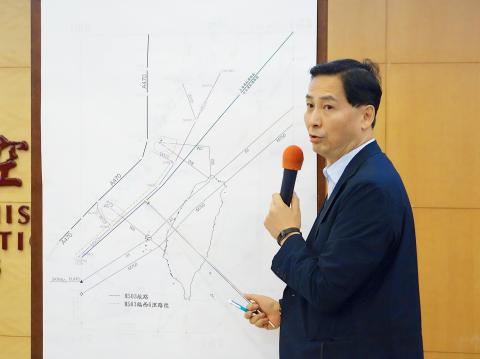The US yesterday expressed its opposition to any unilateral action to change the cross-strait “status quo,” after China reneged on a 2015 cross-strait agreement and unilaterally activated four Taiwan Strait aviation routes.
“We are concerned about reports that Beijing has modified the use of civil aviation flight routes in the Taiwan Strait without consultation with Taiwan authorities,” American Institute in Taiwan (AIT) spokeswoman Sonia Urbom said.
Issues related to civil aviation and safety in the Taiwan Strait should be decided through dialogue between both sides, she said.

Photo: Cheng Wei-chi, Taipei Times
The AIT made the remarks one day after the Mainland Affairs Council — the government agency tasked with handling cross-strait affairs — strongly protested Beijing’s activation of the four aviation routes.
Criticizing the one-sided move as China’s attempt to cover its malicious military and political intentions toward Taiwan under the pretext of civil aviation, the council on Thursday said it would inform the US and the International Civil Aviation Organization about the situation.
The four routes are northbound flights on the main M503 route, which is very close to the median line of the Taiwan Strait, as well as three intersecting extension routes — W121, W122 and W123 — along the southeast coast of China.
The launch of the routes was in direct violation of an agreement reached by both sides in 2015 under which only southbound flights on route M503 would be permitted and the activation of the three extension routes would not come until after further negotiations had been completed.
Reiterating Washington’s official stance on cross-strait relations, Urbom said the US opposed any unilateral actions by either side of the Taiwan Strait to alter the cross-strait “status quo.”
“We encourage authorities in Beijing and Taipei to engage in constructive dialogue, on the basis of dignity and respect,” she added.
President Tsai Ing-wen (蔡英文) yesterday on Twitter called on China to uphold the “status quo,” saying Beijing’s unilateral action is destabilizing and should be avoided.
China’s actions, “including the M503 flight route and increased military exercises,” are destabilizing and undermine regional stability, she said.
She pledged that Taiwan would continue to uphold the “status quo” across the Taiwan Strait and urged “all parties to do the same.”
Presidential Office spokesman Alex Huang (黃重諺) said the National Security Council earlier yesterday met to discuss the effects of China’s decision to open the M503 route to northbound commercial flights.
They said the move contravenes the 2015 agreement between China and Taiwan that opened the M503 route to southbound commercial traffic.
The council found that China’s action had unilaterally changed the “status quo,” as well as severely affecting peace and stability in East Asia, causing increased tension in the region, Huang said.
The council would monitor the situation closely, and work with all parties to ensure national and regional security, he said.

Tropical Storm Gaemi strengthened into a typhoon at 2pm yesterday, and could make landfall in Yilan County tomorrow, the Central Weather Administration (CWA) said yesterday. The agency was scheduled to issue a sea warning at 11:30pm yesterday, and could issue a land warning later today. Gaemi was moving north-northwest at 4kph, carrying maximum sustained winds near its center of up to 118.8kph and gusts of 154.8kph. The circumference is forecast to reach eastern Taiwan tomorrow morning, with the center making landfall in Yilan County later that night before departing from the north coast, CWA weather forecaster Kuan Shin-ping (官欣平) said yesterday. Uncertainty remains and

SEA WARNING LIKELY: The storm, named Gaemi, could become a moderate typhoon on Wednesday or Thursday, with the Taipei City Government preparing for flooding A tropical depression east of the Philippines developed into a tropical storm named Gaemi at 2pm yesterday, and was moving toward eastern Taiwan, the Central Weather Administration (CWA) said. Gaemi could begin to affect Taiwan proper on Tuesday, lasting until Friday, and could develop into a moderate typhoon on Wednesday or Thursday, it said. A sea warning for Gaemi could be issued as early as Tuesday morning, it added. Gaemi, the third tropical storm in the Pacific Ocean this typhoon season, is projected to begin moving northwest today, and be closest to Taiwan on Wednesday or Thursday, the agency said. Today, there would likely

DISRUPTIONS: The high-speed rail is to operate as normal, while several airlines either canceled flights or announced early departures or late arrivals Schools and offices in 15 cities and counties are to be closed today due to Typhoon Gaemi, local governments announced last night. The 15 are: Taipei, New Taipei City, Taoyuan, Tainan, Keelung, Hsinchu and Kaohsiung, as well as Yilan, Hualien, Hsinchu, Miaoli, Chiayi, Pingtung, Penghu and Lienchiang counties. People should brace for torrential rainfall brought by the storm, with its center forecast to make landfall on the east coast between tonight and tomorrow morning, the Central Weather Administration (CWA) said. The agency issued a sea warning for the typhoon at 11:30pm on Monday, followed by a land warning at 11:30am yesterday. As of

CASUALTY: A 70-year-old woman was killed by a falling tree in Kaohsiung as the premier warned all government agencies to remain on high alert for the next 24 hours Schools and offices nationwide are to be closed for a second day today as Typhoon Gaemi crosses over the nation, bringing torrential rain and whipping winds. Gaemi was forecast to make landfall late last night. From Tuesday night, its outer band brought substantial rainfall and strong winds to the nation. As of 6:15pm last night, the typhoon’s center was 20km southeast of Hualien County, Central Weather Administration (CWA) data showed. It was moving at 19kph and had a radius of 250km. As of 3pm yesterday, one woman had died, while 58 people were injured, the Central Emergency Operation Center said. The 70-year-old